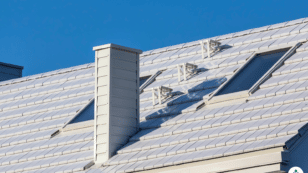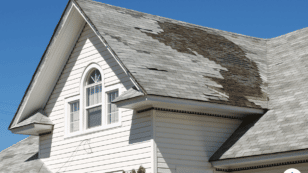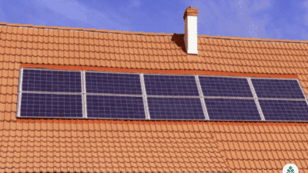

Best Time to Replace Your Roof Is In The Fall - (Surprising Reason Why)
If you’re hoping to replace your roof, most roofers believe that fall is the best time of year to do it. However, as long as the weather isn’t severe, you can get a new roof installed during any season.
Each product and or company featured here has been independently selected by the writer. You can learn more about our review methodology here. If you make a purchase using the links included, we may earn commission.
If you’re thinking about replacing your roof, there are probably a few questions swirling around in your head: how urgently do I need to get this replacement done? Is this the right time of year to get my roof replaced? What will happen if I wait too long?
You’ve started researching a roof replacement, but the amount of information on the internet feels overwhelming.
We can help you cut through the noise.
Which Season Is Overall The Best To Replace Your Roof?
Simply put, most roofers consider fall to be the best time of year to replace your roof.
But, if you need an emergency roof replacement or your roof is severely damaged, you can replace your roof any time of year. You just can’t replace a roof during inclement weather. Unfortunately, we can’t predict the weather, but we can make a safe bet depending on the season. Months with milder temperatures and fewer extreme weather events are typically the best time for a reroof.
If you are curious on why people choose to install a roof in other season read on to find out why roof installation might be valuable during other times of the years as well.

Power Home

Average cost
Pros
- Positive industry reputation
- Lifetime or lengthy warranty
- 10+ years of experience
- Positive customer reviews
- Uses eco-friendly materials
- Well-trained, certified installers
- Variety of roofing styles available
Cons
- Limited variety of roofing materials
- Short or nonexistent warranty
- No financing information available
- Expensive
- Little information available on company website

Erie Home

Zero Down - 18 months same as cash with minimum monthly payment
Average cost
Pros
- Lifetime or lengthy warranty
- Widespread availability
- 10+ years of experience
- Positive customer reviews
- Uses eco-friendly materials
- Financing options available
- Well-trained, certified installers
- Uses durable materials meant to last
- Variety of roofing styles available
Cons
- Limited variety of roofing materials
- Expensive

Aspen Contracting

Average cost
Pros
- Positive industry reputation
- Lifetime or lengthy warranty
- Widespread availability
- 10+ years of experience
- Positive customer reviews
- Financing options available
Cons
- Little information available on company website
Is Fall Really the Best Season For a Roof Replacement?
Cooler temperatures and more consistent weather make fall, according to most roofing experts, the best time of year to install a new roof.
That also means that early fall is usually the busiest time for roofers, so schedule as far in advance as possible.
Pros of Roof Installation in September, October or November
Mild weather and cool temperatures mean that there’s no better time to replace your roof than fall. Shingle sealants also set most effectively in mild temperatures, so your roofer can work more efficiently.
With fewer weather-related obstacles, roofers can accomplish more during the day and avoid rescheduling appointments.
Cons of Replacing Your Roof In Fall
Fall is the busiest time of year for most roofing companies, so you may be hard-pressed to schedule your installation if you wait too long. Because fall is such a popular time for home improvement projects, prices can also go up, so budget accordingly.
Although fall is the best time to schedule a reroof, spring and early summer are also popular times, so try to be flexible.
Should You Replace Your Roof in the Spring?
Ah, spring. The season of new beginnings. And also the time of year you’re thinking of spring cleaning, including a new roof installation. If you get an early start, you can take advantage of the mild weather before your roofer gets booked up.
Benefits of Replacing Your Roof in March, April or May
As the ice starts to thaw and the weather begins warming up, more people will be thinking about scheduling a roof replacement.
If you live in a climate that experiences harsh winters, spring is the time you’ll be looking out for any roof damage sustained over the winter. Ice, snow, hail and freezing rain can easily wear out a roof, so addressing these issues in the early spring can extend its lifespan.
Like fall, spring typically has milder temperatures than summer and winter, making it easier for your contractor to complete a roof repair or installation.
Cons of a Spring Roof Installation
We all know the saying “April showers bring May flowers.” But those April showers may not be so favorable if you’re trying to schedule a roof installation.
If you live in a state that experiences unpredictable periods of heavy rain in the springtime, your scheduled roof installation may get moved back.
If your roofing company is still coming out of its slow winter season, it may be easy to reschedule, but as the weather gets warmer and more people are installing new roofs, you may have to wait awhile.
Of course, there’s a risk of inclement weather postponing your roof installation at any time of the year. Just make sure to weigh the risks and benefits of scheduling your roof replacement in the spring.
If you’re ready to schedule your roof replacement project, or just speak with a professional, we’ve got you covered. Select one of our top-ranked roofing companies to get started with a free, no-pressure estimate.
Why is Summer a Popular Season for Roof Installation?
Summer is the most common time for a roof installation. Homeowners have more spare time to take on home improvement projects during this time, so summer is the busy season for many roofing companies.
The Pros of Roof Installation in June, July or August
Summer is a popular time of year to move, sell or fix up homes, so it’s no surprise that summer is the busy season for roof replacements. The weather is warm and sunny, and you may be thinking about fixing any leaks or damage from the rainy season before.
Roofing companies in areas that experience hurricanes stay busy during the summer season. Heavy storms and storm damage mean more business for your roofer, so schedule ahead when you can.
As the summer months go on and the weather becomes hotter and more unpredictable, you’ll start to see a decline in roofing installations.
Drawbacks of a Summer Roof Replacement
Early summer is a very popular time to get a roof installed, so scheduling your roofing project during this time of year may pose a challenge. In addition to scheduling issues, higher demand can also mean higher prices.
Once late summer rolls around, very hot weather makes roof installations less ideal. For starters, the weather is less predictable, so there’s a higher risk that your contractor will postpone due to heavy rains or hurricanes (depending on where you live).
Your roofer will have to stop more and take more breaks on very hot days, extending the time it takes to complete the project.
Plus, shingles set best in moderate temperatures — not extreme cold or extreme heat.
Can You Replace Your Roof in the Winter?
Most roofing professionals will not recommend that you have your roof replaced during the winter months. That being said, it is still possible to install a roof in December, January or February if necessary.
Benefits of Replacing Your Roof in December, January or February
Although most roofing contractors consider winter as a less-than-ideal time to replace your roof, there are still some benefits to having a new roof installed in the colder months.
The greatest benefit of a winter roof installation? Availability. Winter is generally a very slow time for roofers, so if you need an emergency roof replacement, chances are they’ll be able to fit you in quickly.
The downsides of a winter roof installation aren’t as pronounced in temperate climates. If you live in an area that rarely experiences cold temperatures, ice or snow, winter is as good a time as any to get started on your roofing project.
Cons of Winter Roof Installation
Scheduling your roof installation for winter can get dicey. If you live in an area that gets snow, freezing rain and ice during the colder months, a winter installation is not ideal.
Of course, walking on a roof covered in ice or snow is slippery and thus extremely dangerous. inclement winter weather may force your roofer to postpone and reschedule your roof replacement until conditions improve.
Even if the day of your installation is clear, cold weather can present obstacles for a roof installation. Temperatures below 40 degrees Fahrenheit can prevent your shingles from sealing properly.
Asphalt shingles also can become brittle in cold weather, making them more difficult for your roofer to cut to size and attach to your home. This also means that your contractor will have to be more careful when walking on your roof. Both of these factors can slow down the installation of your asphalt shingle roof, meaning you pay more in labor costs.
It’s important to note that metal, tile and slate roofing do not become brittle or difficult to work worth in cold weather (another reason why we recommend metal roofing more than any other type of roof).
Finding a Good Roofing Contractor Near You
When it comes to installing a new roof, finding the right roofing contractor can be the difference between a pleasant experience and a miserable one. Before you decide who to hire for your roofing project, do your research and ask:
- Is this roofing company locally based?
- Is this roofing company licensed, certified and insured?
- Does it guarantee quality workmanship with a warranty?
- Does it have positive online reviews (especially recent reviews)?
If the answer to any of these questions is no, keep looking. Or, if you want to save time, check out one of our top-recommended roofing providers below to get a free roof inspection and estimate. We’ve researched dozens of roofing companies, and these are our favorites.
FAQ: Best Time to Replace Your Roof
Roofers generally agree that fall is the best time of year to replace your roof, thanks to the mild, predictable weather.
Although not ideal, you can replace your roof in the winter. Just be aware that cold temperatures and winter weather like ice or snow can slow down your installation.
Winter and early spring are considered the roofing off-season, so you may be able to score lower prices on a roofing installation. That being said, inclement weather can make your roof replacement more dangerous and time-consuming for your roofer, so you may pay more in labor costs.

 233k
233k  41k
41k  Subscribe
Subscribe 
















